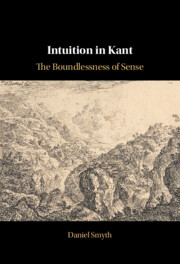500 results
Chapter 21 - Goethe and German Idealism
- from Part IV - Philosophy and Science
-
-
- Book:
- Goethe in Context
- Published online:
- 16 May 2024
- Print publication:
- 23 May 2024, pp 206-215
-
- Chapter
- Export citation
Chapter 22 - Morphology
- from Part IV - Philosophy and Science
-
-
- Book:
- Goethe in Context
- Published online:
- 16 May 2024
- Print publication:
- 23 May 2024, pp 216-224
-
- Chapter
- Export citation
Chapter 20 - Goethe’s Improper Mode of Thought
- from Part IV - Philosophy and Science
-
-
- Book:
- Goethe in Context
- Published online:
- 16 May 2024
- Print publication:
- 23 May 2024, pp 196-205
-
- Chapter
- Export citation
Chapter 19 - Goethe and Philosophy
- from Part IV - Philosophy and Science
-
-
- Book:
- Goethe in Context
- Published online:
- 16 May 2024
- Print publication:
- 23 May 2024, pp 187-195
-
- Chapter
- Export citation
Jordan Pascoe’s Kant’s Theory of Labour: A Kantian Engagement
-
- Journal:
- Kantian Review , First View
- Published online by Cambridge University Press:
- 19 April 2024, pp. 1-8
-
- Article
-
- You have access
- Open access
- HTML
- Export citation
Kant’s Critique of the Ontological Argument: Comments on Ian Proops’s The Fiery Test of Critique
-
- Journal:
- Kantian Review , First View
- Published online by Cambridge University Press:
- 19 April 2024, pp. 1-11
-
- Article
-
- You have access
- Open access
- HTML
- Export citation
Introduction - Time, Recognition, and the Worlds of Yeats’s Work
-
- Book:
- Yeats, Revival, and the Temporalities of Irish Modernism
- Published online:
- 11 April 2024
- Print publication:
- 18 April 2024, pp 1-23
-
- Chapter
- Export citation
Followability, Necessity, and Excuse: Interpreting Kant’s Penal Theory
-
- Journal:
- Kantian Review , First View
- Published online by Cambridge University Press:
- 04 April 2024, pp. 1-18
-
- Article
-
- You have access
- Open access
- HTML
- Export citation
Response to Critics: Kant’s Theory of Labour
-
- Journal:
- Kantian Review , First View
- Published online by Cambridge University Press:
- 04 April 2024, pp. 1-10
-
- Article
-
- You have access
- Open access
- HTML
- Export citation
Proops’s ‘Nugget of Gold’ in Kant’s Dialectic
-
- Journal:
- Kantian Review , First View
- Published online by Cambridge University Press:
- 04 April 2024, pp. 1-9
-
- Article
- Export citation

Intuition in Kant
- The Boundlessness of Sense
-
- Published online:
- 07 March 2024
- Print publication:
- 14 March 2024
Kant’s Principia Diiudicationis and Executionis
-
- Journal:
- Kantian Review , First View
- Published online by Cambridge University Press:
- 01 March 2024, pp. 1-15
-
- Article
-
- You have access
- Open access
- HTML
- Export citation
Chapter 1 - V. S. Naipaul Aesthetic Ideology and World Literature
-
- Book:
- V. S. Naipaul and World Literature
- Published online:
- 01 February 2024
- Print publication:
- 08 February 2024, pp 13-29
-
- Chapter
- Export citation
Chapter 4 - Impure Aesthetics
- from Part II - Aesthetic Conventions
-
- Book:
- Colonialism, World Literature, and the Making of the Modern Culture of Letters
- Published online:
- 19 January 2024
- Print publication:
- 08 February 2024, pp 149-173
-
- Chapter
- Export citation
The Postulate of Immortality in the Critique of Practical Reason (and Beyond)
-
- Journal:
- Kantian Review / Volume 29 / Issue 1 / March 2024
- Published online by Cambridge University Press:
- 26 January 2024, pp. 19-38
- Print publication:
- March 2024
-
- Article
-
- You have access
- HTML
- Export citation
Why Did Kant Conceive of the Critique of Pure Reason as a Critique? Comments on Gabriele Gava’s Kant’s Critique of Pure Reason and the Method of Metaphysics
-
- Journal:
- Kantian Review / Volume 29 / Issue 1 / March 2024
- Published online by Cambridge University Press:
- 08 January 2024, pp. 103-113
- Print publication:
- March 2024
-
- Article
- Export citation
Kant on Free Speech: Criticism, Enlightenment, and the Exercise of Judgement in the Public Sphere
-
- Journal:
- Kantian Review / Volume 29 / Issue 1 / March 2024
- Published online by Cambridge University Press:
- 15 December 2023, pp. 61-80
- Print publication:
- March 2024
-
- Article
-
- You have access
- Open access
- HTML
- Export citation
Living Freedom: The Heautonomy of the Judgement of Taste
-
- Journal:
- Kantian Review / Volume 29 / Issue 1 / March 2024
- Published online by Cambridge University Press:
- 13 December 2023, pp. 81-102
- Print publication:
- March 2024
-
- Article
- Export citation
Maxims: Responsibility and Causal Laws
-
- Journal:
- Kantian Review / Volume 29 / Issue 1 / March 2024
- Published online by Cambridge University Press:
- 13 December 2023, pp. 1-18
- Print publication:
- March 2024
-
- Article
-
- You have access
- Open access
- HTML
- Export citation
Kant’s Derivation of Imperatives of Duty
-
- Journal:
- Kantian Review / Volume 29 / Issue 1 / March 2024
- Published online by Cambridge University Press:
- 11 December 2023, pp. 39-59
- Print publication:
- March 2024
-
- Article
-
- You have access
- Open access
- HTML
- Export citation



